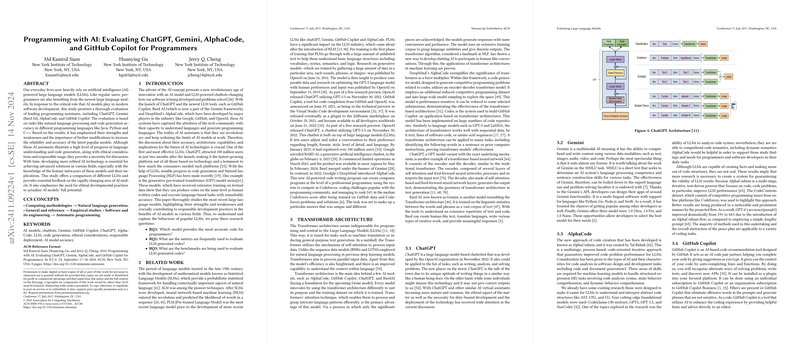Evaluation of Leading AI Programming Assistants: ChatGPT, Gemini, AlphaCode, and GitHub Copilot
The paper in question offers a comprehensive evaluation of four prominent AI-powered programming assistants: ChatGPT, Gemini, AlphaCode, and GitHub Copilot. This evaluation focuses on their capabilities in natural language processing and code generation across different programming languages such as Java, Python, and C++. The paper aims to address critical questions concerning the accuracy and reliability of these models, proposing a comparative analysis to highlight their strengths and weaknesses.
Summary of Findings
The methodology applied in the paper encompasses an empirical analysis across a variety of benchmarks, notably including HumanEval and LeetCode, to comparatively assess the performance of these LLMs. Key metrics such as pass@k and Test Case Pass Rate are employed to gauge model performance. For instance, ChatGPT, particularly its GPT-4-Turbo-0125 variant, was found to exhibit high efficacy with an accuracy rate of 87.2% on the HumanEval benchmark, thereby establishing its prominence in producing accurate code. Gemini, while slightly less accurate, still demonstrates competitive performance characteristics, especially in multi-modal applications enabled by its transformer architecture.
Another salient finding is the variation in efficacy across different tasks. For instance, the investigation revealed that ChatGPT consistently outperformed others in code generation tasks, while GitHub Copilot demonstrated a substantial capacity to enhance developer productivity through real-time code suggestions.
Implications for AI Development
The implications of these findings are substantial for both practical applications and theoretical advancements. On a practical level, the integration of such LLMs into development workflows promises significant improvements in productivity by automating routine coding tasks and providing intelligent suggestions. Theoretically, the advancements in transformer architectures underpinning these LLMs pave the way for future research into more robust and nuanced LLMs capable of understanding and executing complex programming logic.
Ethically, the paper underscores the importance of developing and implementing these models with a commitment to fairness and unbiased outputs. Issues pertaining to the replication of biases inherent in training datasets were highlighted, alongside suggestions for safeguarding against such biases.
Anticipated Developments
Future directions in this domain are poised to build on the comparative insights provided by this evaluation. As AI models become increasingly sophisticated, consideration of ethical deployment practices and enhancements in contextual understanding will become paramount. The ongoing development of these models suggests a trajectory towards more intelligent, context-aware programming assistants that not only generate accurate code but do so in a manner that is aligned with ethical standards.
The collaborative dynamics between human programmers and AI assistants will further evolve, likely leading to new paradigms in software development that leverage the strengths of both. Continued research into refining LLMs and optimizing their application to diverse programming tasks will be critical in realizing their full potential.
In conclusion, while the research provides a clear snapshot of the current capabilities and limitations of leading LLM-powered programming assistants, it also establishes a foundation for future explorations into their ethical application and enhanced performance in software development environments.
